音标课 外研社出版决胜英语 Unit9
- 格式:ppt
- 大小:13.51 MB
- 文档页数:19
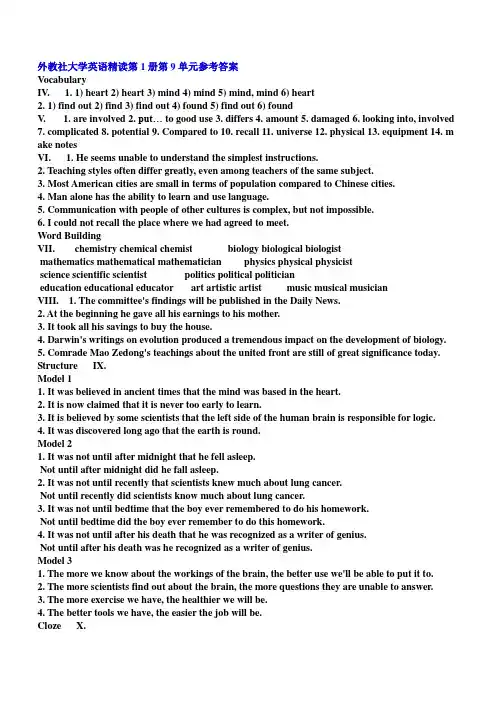
外教社大学英语精读第1册第9单元参考答案VocabularyIV. 1. 1) heart 2) heart 3) mind 4) mind 5) mind, mind 6) heart2. 1) find out 2) find 3) find out 4) found 5) find out 6) foundV. 1. are involved 2. put… to good use 3. differs 4. amount 5. damaged 6. looking into, involved 7. complicated 8. potential 9. Compared to 10. recall 11. universe 12. physical 13. equipment 14. m ake notesVI. 1. He seems unable to understand the simplest instructions.2. Teaching styles often differ greatly, even among teachers of the same subject.3. Most American cities are small in terms of population compared to Chinese cities.4. Man alone has the ability to learn and use language.5. Communication with people of other cultures is complex, but not impossible.6. I could not recall the place where we had agreed to meet.Word BuildingVII. chemistry chemical chemist biology biological biologistmathematics mathematical mathematician physics physical physicistscience scientific scientist politics political politicianeducation educational educator art artistic artist music musical musicianVIII. 1. The committee's findings will be published in the Daily News.2. At the beginning he gave all his earnings to his mother.3. It took all his savings to buy the house.4. Darwin's writings on evolution produced a tremendous impact on the development of biology.5. Comrade Mao Zedong's teachings about the united front are still of great significance today. Structure IX.Model 11. It was believed in ancient times that the mind was based in the heart.2. It is now claimed that it is never too early to learn.3. It is believed by some scientists that the left side of the human brain is responsible for logic.4. It was discovered long ago that the earth is round.Model 21. It was not until after midnight that he fell asleep.Not until after midnight did he fall asleep.2. It was not until recently that scientists knew much about lung cancer.Not until recently did scientists know much about lung cancer.3. It was not until bedtime that the boy ever remembered to do his homework.Not until bedtime did the boy ever remember to do this homework.4. It was not until after his death that he was recognized as a writer of genius.Not until after his death was he recognized as a writer of genius.Model 31. The more we know about the workings of the brain, the better use we'll be able to put it to.2. The more scientists find out about the brain, the more questions they are unable to answer.3. The more exercise we have, the healthier we will be.4. The better tools we have, the easier the job will be.Cloze X.(A) (1)potential (2)complex (3)differs (4)ancient (5)recent (6)limit (7)ability(8)recall (9)exactly (10)compared to (11)unable (12)complicated(B) 1. (1)to (2)with (3)hear (4)side (5)with (6)it (7)side (8)work (9)both (10)done /made(11) which (12)with (13)both (14)who (15)much (16)working (17)which (18)therefore (19)to2.(1)An (2)something (3)forgotten (4)AND (5)important (6) you (7)review (8)have (9)what (10)of(11)where (12)learnt (13)continue (14)shown (15)what (16)for (17)break (18)will (19)just (20)During (21)exercise (22)because (23)Therefore /So (24) Listening (25)air (26)other / rightTranslationXI.1. Certain chemicals should not be mixed, as they may have a violent reaction.2. Recent events have proved that their attitude to the government's new foreign policy is correct.3. This philosopher of ancient Greece seemed to be able to put complicated thoughts into simple w ords.4. Over and over again, the nation has got involved in foreign wars.5. We had a very heated discussion about the question. However, it's not easy to tell exactly what e ach person said.6. In the past twenty years, there has been a great increase in the amount of research being done o n the cause of cancer.7. There seems to be no limit to human beings' ability to learn.8. Scientists all agree that a better understanding of the human brain will help man to make full use of its limitless potential.Key to Reading PracticeExercise A1. They (psychologists) try to understand the way that people interpret what they see. (in the middle)2. Your brain interprets the information your eyes give you. (at the end)3. Psychologists have found that people learn to understand and interpret what they see easily. (at the beginning)4. Sometimes we make mistakes (in interpreting what we see )… Sometimes we are wrong. (at both the beginning and the end)5. The way we see things is more complicated than we imagine. (at the beginning)Exercise B 1. T2. F If you know the color of an object, your brain will keep telling you what color it is, though it c hanges color in different situations.3. T4. F … he found everything had changed only in position, not in size.5. F In a few weeks the psychologist got used to the new world around him.6. F Our brains also make mistakes in interpreting what we see.7. T8. T9. T 10. TExercise C 1. 如果你有辆蓝色汽车,那么即使在明亮的阳光下、在黑暗中或在昏黄的路上,你也知道它是蓝色的。
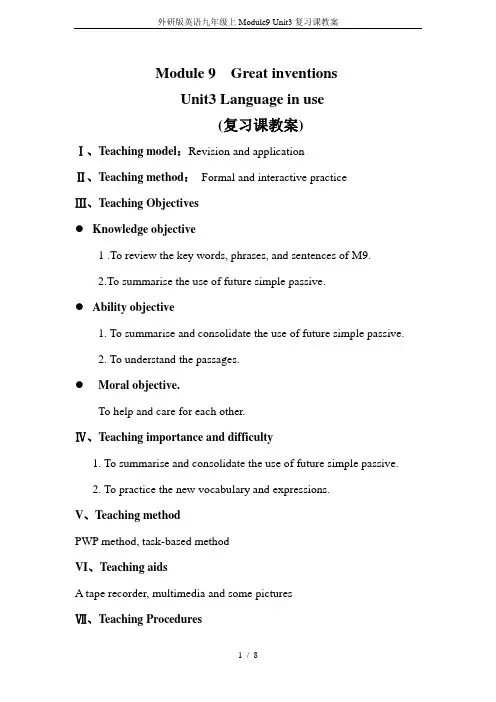
Module 9 Great inventionsUnit3Language in use(复习课教案)Ⅰ、Teaching model:Revision and applicationⅡ、Teaching method:Formal and interactive practiceⅢ、Teaching Objectives●Knowledge objective1 .To review the key words, phrases, and sentences of M9.2.To summarise the use of future simple passive.●Ability objective1. To summarise and consolidate the use of future simple passive.2. To understand the passages.●Moral objective.To help and care for each other.Ⅳ、Teaching importance and difficulty1. To summarise and consolidate the use of future simple passive.2. To practice the new vocabulary and expressions.V、Teaching methodPWP method, task-based methodVI、Teaching aidsA tape recorder, multimedia and some picturesⅦ、Teaching ProceduresLearning Aims (学习目标)1 .To review the key words, phrases, and sentences of M9.2. To use the future simple passive.Step 1:Review the knowledge (知识回顾)1.师友互查1)Review the phrases1.put up2. thousands of3.lend sth. to sb.4. look through5. at a time6.by hand7. in a way2) 课文原句在现1. They’ll be put up on the school website.2. Will computers be used more than books in the future?3. Will books be replaced by the Internet?4. And they can be seen on the Internet by other classes, even people living in other countries.plete the sentences and conversations with the correct form of the words and expressions in brackets.1. ______ books _________(replace) by computers in the future?2. My bike is broken. It _______(fix) tomorrow.3. —Dad, can I use the Internet this evening?—Yes, but the computer is not on yet. The electricity________(not connect) until nine o’clock.4. _______ the problem _____________ (talk about) at the meeting tomorrow?5. Who ____________ (invite) to give a report about great inventions next Friday?6. —When _______ the work __________(finish)?—In two days.(友情提示:先自主完成再互助检查,说明原因)II.教师点评一般将来时的被动语态:(1) 主语+ will be + 动词过去分词(+by+动作执行者)(2)主语+ am/is/are going to be + 动词过去分词(+ by+动作执行者)1. 肯定句形式:主语+will/be (am/is/are) going to+be+done2. 否定句形式:主语+will not/be (am/is/are) not going to + be +done3. 一般疑问句形式:Will+主语+be+done?Be (am/is/are) +主语+going to+be done?4. 特殊疑问句形式:特殊疑问词+will+主语+be+done?特殊疑问词+be (am/is/are) +主语+going to+be done?(师傅帮助学友完善笔记!)Step 2: Explanation.(题型讲解)I.师友互讲1.Look at the pictures and describe the new classroom that will be built. Use the words in the box to help you.build buy changeA new floor will be built.New furniture / desks/ chairs will be bought.A new blackboard will be bought.A new interactive whiteboard will be bought.The windows and the door will be changed.The teacher’s desk will be painted.The lights will be changed.The colour of the walls will be changed.The walls will be fixed.2.Work in pairs. Ask and answer questions about these great inventions.A: When was the telephone invented?B: It was invented in 1875.…A: What kind of telephone do you think will be made in the future?B: …plete the sentences with the words in the box.direction introduction spread trade1. Before the ___________ of printing, few people could read.2. There were more books to sell, so the __________ in books grew.3. Because more people could read, ideas __________ quickly.4. What _________ will printing take in the future?5.Listen and find out where the speaker is.a) In a school library.b) In the British Library.c) In the British Museum6.Listen again and answer the questions.1.Why were so few books produced in ancient times?2. Why were many old books copied onto a computer?3. How has the computer helped people read old books in the British Library?II.教师点评1.听力在播放前,先预测;抓关键词,扑捉有效信息;2.师友自主练习,学友讲给师傅听,师傅纠正错误,并说明原因。

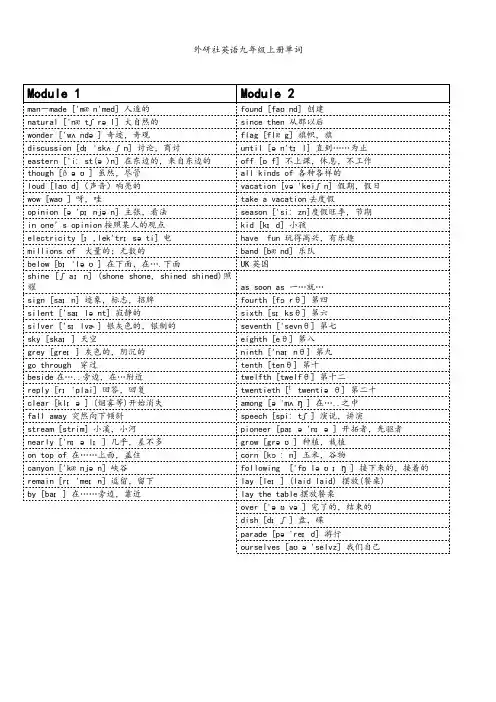
外研社英语九年级上册单词man-made ['mæn'med] 人造的found [faʊnd] 创建natural ['nætʃrəl] 大自然的since then 从那以后wonder ['wʌndə] 奇迹,奇观flag [flæg] 旗帜,旗discussion [dɪ'skʌʃn] 讨论,商讨until [ən'tɪl] 直到……为止eastern ['iːst(ə)n] 在东边的,来自东边的off [ɒf] 不上课,休息,不工作though [ðəʊ] 虽然,尽管all kinds of 各种各样的loud [laʊd](声音)响亮的vacation [və'keiʃn] 假期,假日wow [waʊ] 呀,哇take a vacation去度假opinion [ə'pɪnjən] 主张,看法season ['siːzn]度假旺季,节期in one’s opinion按照某人的观点kid [kɪd] 小孩electricity [ɪ,lek'trɪsəti] 电have fun 玩得高兴,有乐趣millions of 大量的;无数的band [bænd] 乐队below [bɪ'ləʊ] 在下面,在….下面UK英国shine [ʃaɪn] (shone shone, shined shined)照耀as soon as 一…就…sign [saɪn] 迹象,标志,招牌fourth [fɔrθ] 第四silent ['saɪlənt] 寂静的sixth [sɪksθ] 第六silver ['sɪlvɚ] 银灰色的,银制的seventh ['sevnθ] 第七sky [skaɪ] 天空eighth [eθ] 第八grey [greɪ] 灰色的,阴沉的ninth ['naɪnθ] 第九go through 穿过tenth [tenθ] 第十beside在…..旁边,在…附近twelfth [twelfθ] 第十二reply [rɪ'plai] 回答,回复twentieth [ˈtwentiəθ] 第二十clear [klɪə] (烟雾等)开始消失among [ə'mʌŋ] 在…..之中fall away 突然向下倾斜speech [spiːtʃ] 演说,讲演stream [strim] 小溪,小河pioneer [paɪə'nɪə] 开拓者,先驱者nearly ['nɪəlɪ] 几乎,差不多grow [grəʊ] 种植,栽植on top of 在……上面,盖住corn [kɔːn] 玉米,谷物canyon ['kænjən] 峡谷following ['fɒləʊɪŋ] 接下来的,接着的remain [rɪ'meɪn] 逗留,留下lay [leɪ] (laid laid) 摆放(餐桌)by [baɪ] 在……旁边,靠近lay the table摆放餐桌over ['əʊvə] 完了的,结束的dish [dɪʃ] 盘,碟parade [pə'reɪd] 游行ourselves [aʊə'selvz] 我们自己including [ɪn'kluːdɪŋ] 包含,包括platform ['plætfɔːm] 月台,站台medal ['medl] 奖牌,奖章meeting ['miːtɪŋ] 会议,集会attend [ə'tend] 出席miss [mɪs] 未出席,未出现abroad [ə'brɔːd] 在国外,到国外shut [ʃʌt] 关上,合上once again 再一次lock [lɒk] 锁,锁住doctor ['dɒktə] 博士simple ['sɪmpl] 简单的,容易的degree [dɪ'griː] 课程,学位anybody ['enɪbɒdɪ] 任何人whatever [wɒt'evə] 不管怎么样clock [klɒk] 钟,时钟give up 放弃(努力)ring [rɪŋ] 发出铃声amazing [ə'meɪzɪŋ] 惊人的,极好的passenger ['pæsɪndʒə] 乘客,旅客will [wɪl] 意志,决心address [ə'dres] 地址victory ['vɪktərɪ] 成功胜利text [tekst] 文本,正文simply ['sɪmplɪ] 实在,的确text message短信canadian [kə'neɪdɪən] 加拿大的,加拿大人的couple ['kʌpl] 一对,两个sick [sɪk] 生病的 a couple of 两个少数几个soldier ['səʊldʒə] 军人士兵actually ['æktʃuəli] 事实上treat [triːt] 医治治疗manage ['mænɪdʒ] 管理,支配war [wɔː] 战争unhappy [ʌn'hæpɪ] 不高兴的wound [wuːnd] 伤; 伤口turn off 关闭die for为…..而死order ['ɔːdə] 命令,指示wounded ['wuːndɪd] 受伤的be worried about 担心realise ['rɪəlaɪz] 了解,意识到business [ˈbɪznəs] 工作dying ['daɪɪŋ] 垂死的,即将死亡的on business 出差care [keə] 照顾,照料sofa ['səʊfə] 沙发take care of 照顾,护理snack [snæk] 点心小吃tool [tuːl] 工具,器械midnight ['mɪdnaɪt] 午夜子夜invention [ɪn'venʃən] 发明,创造wake up 醒来at that time那时候hand in 提交,上交on one’s own独自一人empty ['emptɪ] 空的useful ['juːsfʊl] 有用的,有益的unable [ʌn'eɪbl] 不能做某事的rest [rest] 休息,睡眠all day long 整天himself [hɪm'self] 他自己. burn [bɜːn] ( burned burned/ burnt burnt)烧焦,烤糊manage ['mænɪdʒ] 做成,设法完成. cup [kʌp] 杯子一杯饮料operation [ɒpə'reɪʃn] 手术task [tɑːsk] 任务,工作continue [kən'tɪnjuː] 继续die of 死于……Canada ['kænədə] 加拿大upstairs [ʌp'steəz] 往楼上,在楼上deal [diːl] 协议exhibition [eksɪ'bɪʃn] 展览。
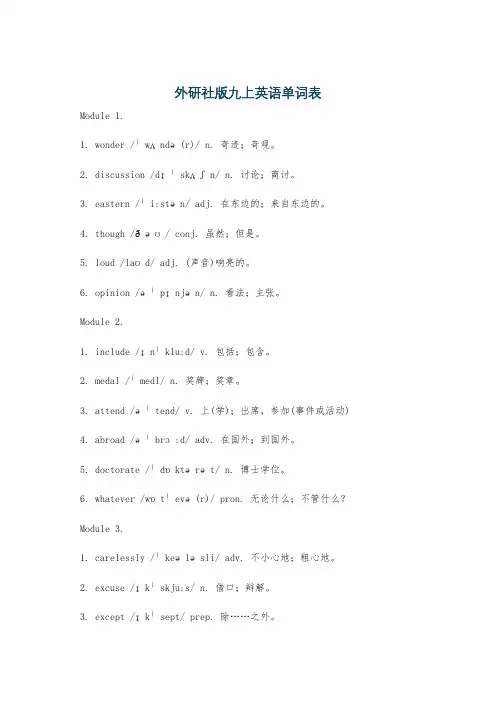
外研社版九上英语单词表Module 1.1. wonder /ˈwʌndə(r)/ n. 奇迹;奇观。
2. discussion /dɪˈskʌʃn/ n. 讨论;商讨。
3. eastern /ˈi:stən/ adj. 在东边的;来自东边的。
4. though /ðəʊ/ conj. 虽然;但是。
5. loud /laʊd/ adj. (声音)响亮的。
6. opinion /əˈpɪnjən/ n. 看法;主张。
Module 2.1. include /ɪnˈklu:d/ v. 包括;包含。
2. medal /ˈmedl/ n. 奖牌;奖章。
3. attend /əˈtend/ v. 上(学);出席,参加(事件或活动)4. abroad /əˈbrɔ:d/ adv. 在国外;到国外。
5. doctorate /ˈdɒktərət/ n. 博士学位。
6. whatever /wɒtˈevə(r)/ pron. 无论什么;不管什么?Module 3.1. carelessly /ˈkeələsli/ adv. 不小心地;粗心地。
2. excuse /ɪkˈskju:s/ n. 借口;辩解。
3. except /ɪkˈsept/ prep. 除……之外。
4. tonight /təˈnaɪt/ adv. 今晚;今夜。
5. shelf /ʃelf/ n. (pl. shelves) 架子;搁板。
6. library /ˈlaɪbrəri/ n. 图书馆。
Module 4.1. medical /ˈmedɪkl/ adj. 医学的;医疗的。
2. treatment /ˈtri:tmənt/ n. 治疗。
3. provide /prəˈvaɪd/ v. 提供;供应。
4. develop /dɪˈveləp/ v. 发展;壮大。
5. illness /ˈɪlnəs/ n. 病;疾病。
6. prevent /prɪˈvent/ v. 防止;预防。
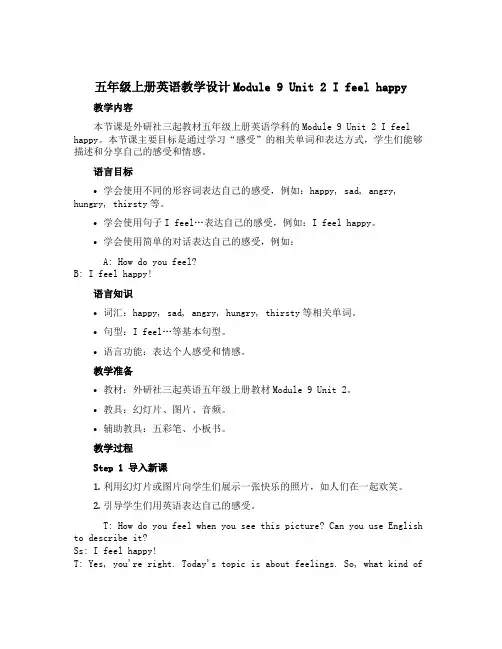
五年级上册英语教学设计Module 9 Unit 2 I feel happy教学内容本节课是外研社三起教材五年级上册英语学科的Module 9 Unit 2 I feel happy。
本节课主要目标是通过学习“感受”的相关单词和表达方式,学生们能够描述和分享自己的感受和情感。
语言目标•学会使用不同的形容词表达自己的感受,例如:happy, sad, angry, hungry, thirsty等。
•学会使用句子I feel…表达自己的感受,例如:I feel happy。
•学会使用简单的对话表达自己的感受,例如:A: How do you feel?B: I feel happy!语言知识•词汇:happy, sad, angry, hungry, thirsty等相关单词。
•句型:I feel…等基本句型。
•语言功能:表达个人感受和情感。
教学准备•教材:外研社三起英语五年级上册教材Module 9 Unit 2。
•教具:幻灯片、图片、音频。
•辅助教具:五彩笔、小板书。
教学过程Step 1 导入新课1.利用幻灯片或图片向学生们展示一张快乐的照片,如人们在一起欢笑。
2.引导学生们用英语表达自己的感受。
T: How do you feel when you see this picture? Can you use English to describe it?Ss: I feel happy!T: Yes, you're right. Today's topic is about feelings. So, what kind offeelings do you know?S: Happy, sad, angry, hungry, thirsty....Step 2 学习单词1.利用幻灯片或图片介绍新单词。
2.指导学生们正确地读音,发音和理解单词的意义。
``` T: Let’s learn some new words about feelings. The first word is。
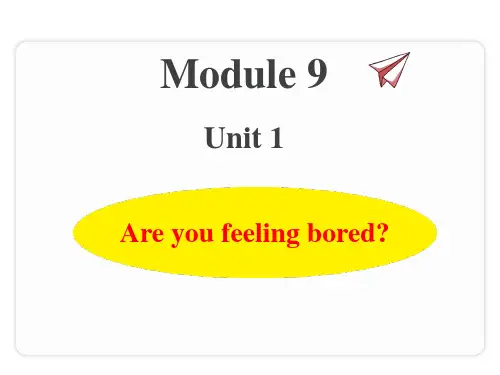
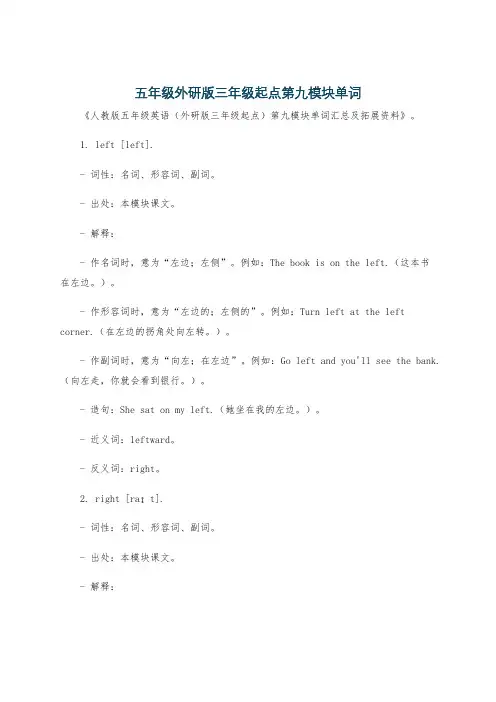
五年级外研版三年级起点第九模块单词《人教版五年级英语(外研版三年级起点)第九模块单词汇总及拓展资料》。
1. left [left].- 词性:名词、形容词、副词。
- 出处:本模块课文。
- 解释:- 作名词时,意为“左边;左侧”。
例如:The book is on the left.(这本书在左边。
)。
- 作形容词时,意为“左边的;左侧的”。
例如:Turn left at the left corner.(在左边的拐角处向左转。
)。
- 作副词时,意为“向左;在左边”。
例如:Go left and you'll see the bank.(向左走,你就会看到银行。
)。
- 造句:She sat on my left.(她坐在我的左边。
)。
- 近义词:leftward。
- 反义词:right。
2. right [raɪt].- 词性:名词、形容词、副词。
- 出处:本模块课文。
- 解释:- 作名词时,意为“右边;右侧”。
例如:The post office is on the right.(邮局在右边。
)。
- 作形容词时,意为“右边的;右侧的”。
例如:The right answer is this one.(正确答案是这个。
这里“right”表示“正确的”,是其常见的另一层意思。
在表示方位时,例如:He is on the right side. 他在右侧。
)。
- 作副词时,意为“向右;在右边”。
例如:Turn right at the second crossing.(在第二个十字路口向右转。
)。
- 造句:You should turn right at the next corner.(你应该在下一个拐角处向右转。
)。
- 近义词:rightward。
- 反义词:left。
3. straight [streɪt].- 词性:形容词、副词。
- 出处:本模块课文。
- 解释:- 作形容词时,意为“直的;笔直的”。
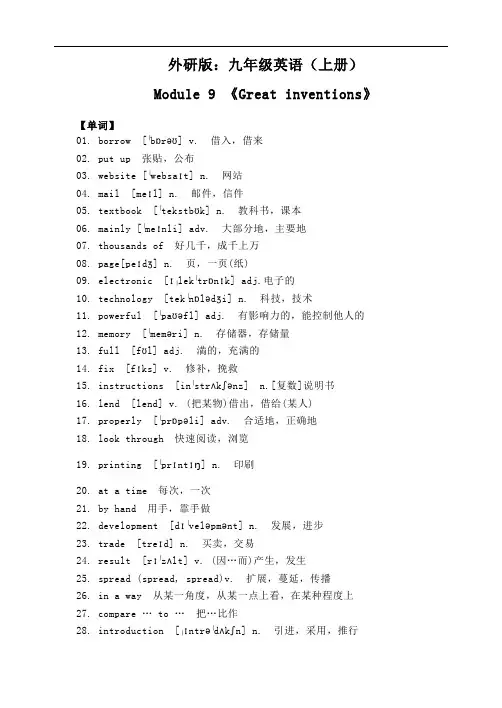
外研版:九年级英语(上册)Module 9 《Great inventions》【单词】01. borrow [ˈbɒrəʊ] v. 借入,借来02. put up 张贴,公布03. website [ˈwebsaɪt] n. 网站04. mail [meɪl] n. 邮件,信件05. textbook [ˈtekstbʊk] n. 教科书,课本06. mainly [ˈmeɪnli] adv. 大部分地,主要地07. thousands of 好几千,成千上万08. page[peɪdʒ] n. 页,一页(纸)09. electronic [ɪˌlekˈtrɒnɪk] adj.电子的10. technology [tekˈnɒlədʒi] n. 科技,技术11. powerful [ˈpaʊəfl] adj. 有影响力的,能控制他人的12. memory [ˈmeməri] n. 存储器,存储量13. full [fʊl] adj. 満的,充满的14. fix [fɪks] v. 修补,挽救15. instructions[inˈstrʌkʃənz] n.[复数]说明书16. lend [lend] v. (把某物)借出,借给(某人)17. properly [ˈprɒpəli] adv. 合适地,正确地18. look through 快速阅读,浏览19. printing [ˈprɪntɪŋ] n. 印刷20. at a time 每次,一次21. by hand 用手,靠手做22. development [dɪˈveləpmənt] n. 发展,进步23. trade [treɪd] n. 买卖,交易24. result [rɪˈzʌlt] v. (因…而)产生,发生25. spread (spread, spread)v. 扩展,蔓延,传播26. in a way 从某一角度,从某一点上看,在某种程度上27. compare … to …把…比作28. introduction [ˌɪntrəˈdʌkʃn] n. 引进,采用,推行29. amount [əˈmaʊnt] n. 量,数量30. store [stɔ:] v. 存储,储藏31. varied [ˈveərid] adj. 各种各样的,各不相同的32. form [fɔ:m] n. 种类,类型,形态,存在形式33. connection [kəˈnekʃn] n. 电话连接,计算机网络连接34. single [ˈsɪŋgl]adj. 仅一个的,单个的35. direction [dɪˈrɛkʃən] n. 方向36. replace[rɪˈpleɪs] v. 替换,取代37. wait and see 等等看,等着瞧【短语归纳】1. to some degree在某种程度上2. put up挂;张贴;公布;举起;搭起;3. on theschool website在学校网站上4.take goodcare of好好照顾;好好看管5. wait forweeks 等好几个星期6. hear from sb. 收到某人的信7. send andreceive photos and emails 发送和接收相片和邮件8. I wonder= I want to know 我想知道9. in the future 在将来in the past 在过去10.thousands of 数以千计的;成千上万的11. electronictechnology 电子技术12. morepowerful 更有效13.anyway 不管怎样14. Here itis . 它在这。